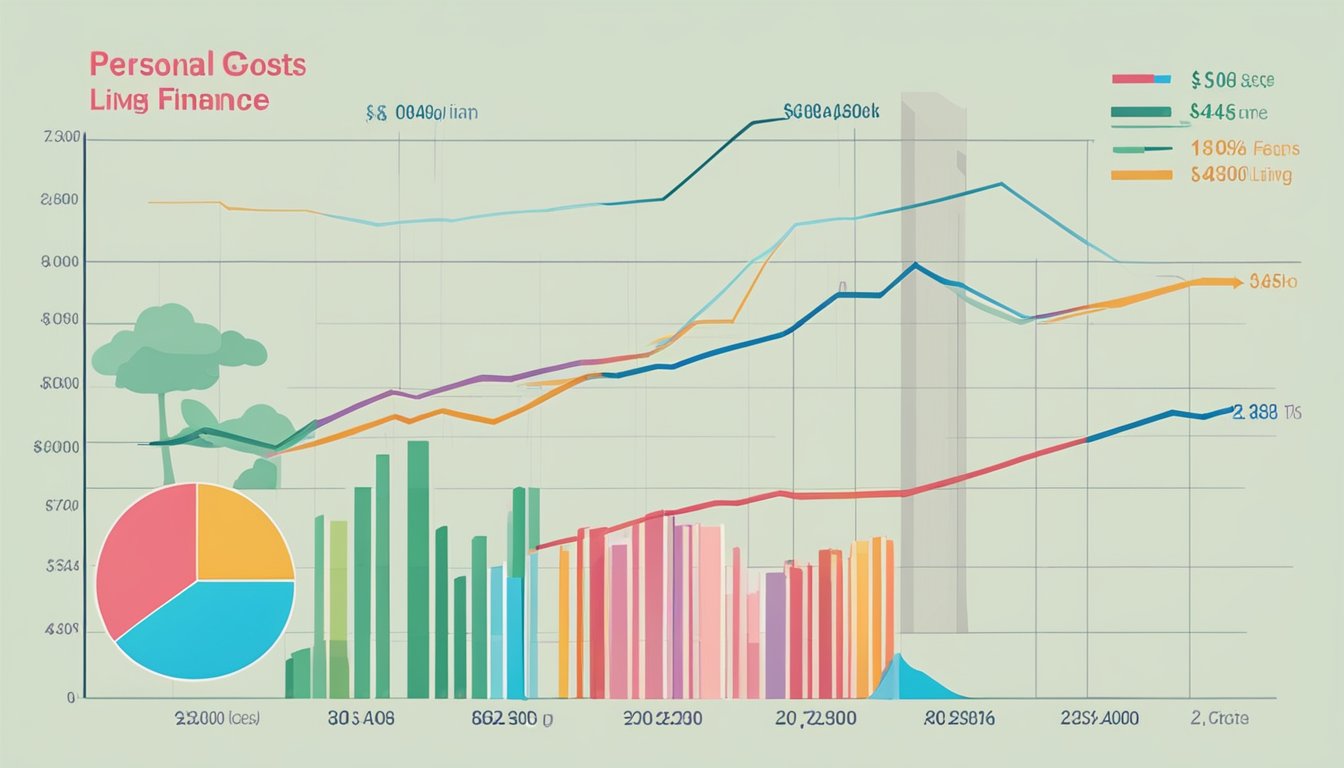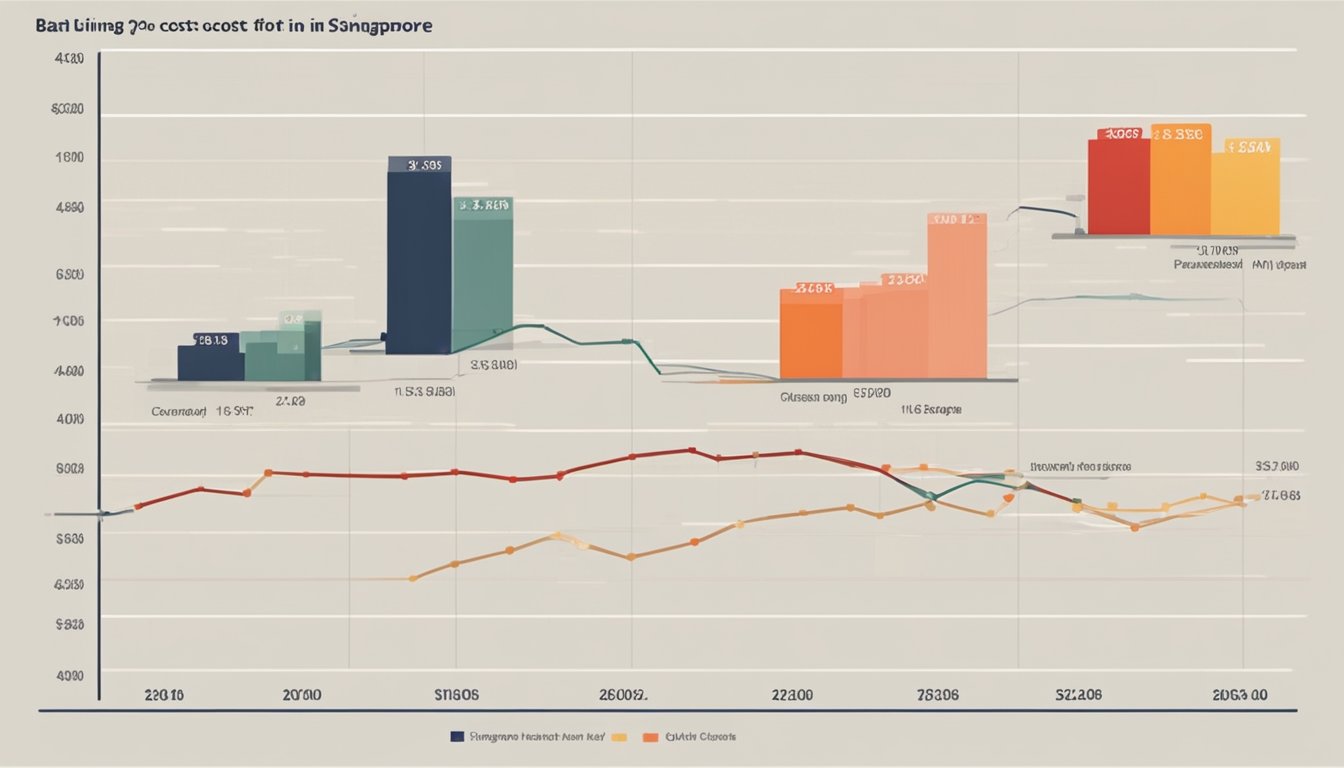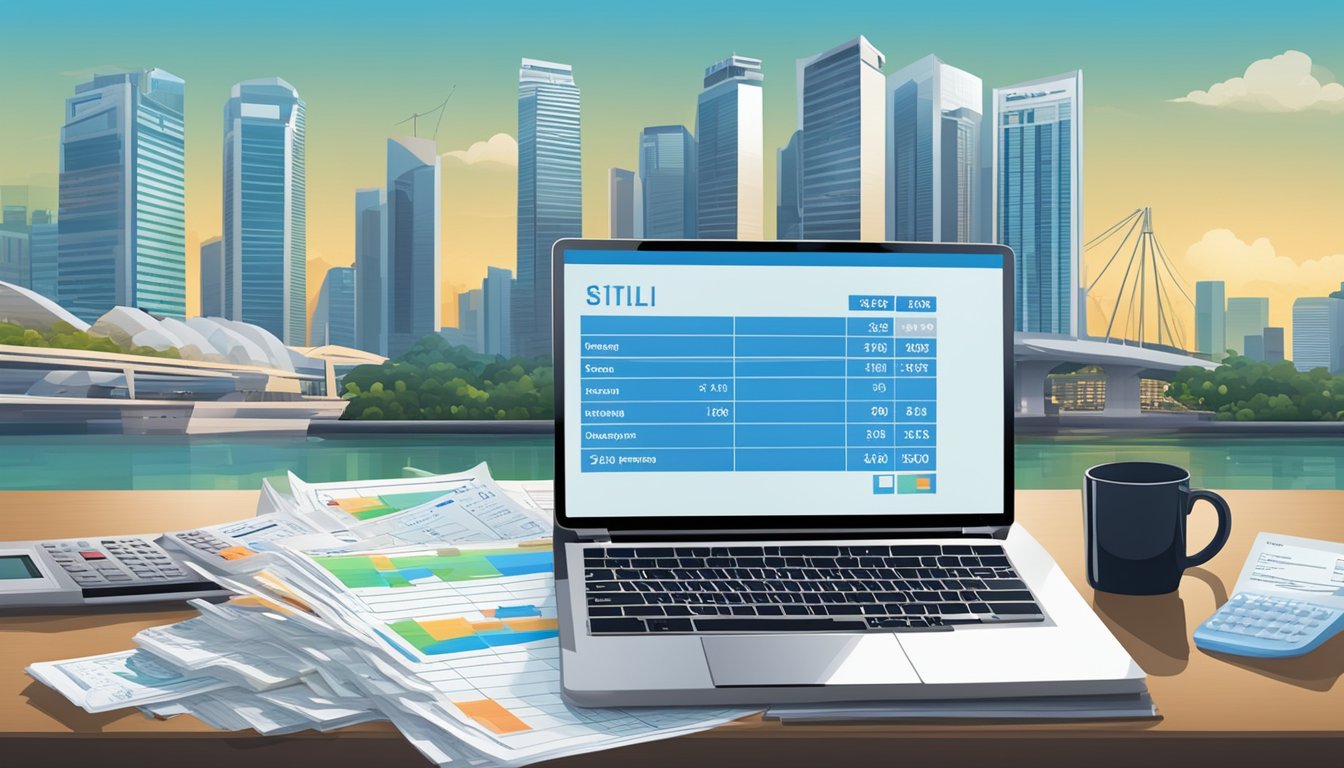Are you struggling to keep up with the rising cost of living in Singapore? You’re not alone. As one of the most expensive cities in the world, Singapore has seen a steady increase in the cost of living over the years.
From housing to food and transportation, every aspect of life in Singapore seems to come with a hefty price tag.

But don’t worry; there are ways to manage your personal finances and cope with the rising cost of living. In this article, we’ll explore some of the best strategies for saving money and staying on top of your finances in Singapore.
Whether you’re a student, a young professional, or a family with kids, these tips will help you make the most of your money and live a comfortable life in Singapore. So, let’s get started!
1-Minute Read: Quick Guide on Singapore’s Rising Costs
Borrowers, pressed for time? This section got the lowdown on thriving in Singapore’s dynamic (read: expensive) environment.
Buckle up and learn how to make the most of your hard-earned money, even as the city keeps you on your toes.
Fact #1: It’s not your imagination.
Singapore’s cost of living is undeniably rising, from groceries to rent. But fear not fellow Singaporeans!
Fact #2: Budgeting is your BFF.
Take control with a clear spending plan. Track every dollar and prioritize essential needs like housing and food.
Fact #3: Every cent counts.
Seek out cost-saving hacks! Consider public transport instead of taxis, explore free entertainment options, and unleash your inner chef with budget-friendly recipes.
Fact #4: Be a savvy shopper.
Embrace promotions and loyalty programs. Remember, comparison is key before you swipe that plastic!
Fact #5: Leverage government support.
Singapore offers fantastic schemes to help residents cope. Investigate initiatives like the GST Voucher scheme to ease the burden.
That’s a financial five-finger discount for busy Singaporeans! But wait, there’s more! Dig deeper into our comprehensive guide and discover powerful strategies to transform you from a budget spectator to a financial champion.
Let’s conquer these rising costs together – your path to financial freedom starts below!
Understanding the Singaporean Economy

If you are living in Singapore, it is essential to understand the country’s economy. The global economy and geopolitical tensions heavily influence the economy of Singapore tensions. The Monetary Authority of Singapore (MAS) plays a vital role in maintaining the country’s economic stability.
Impact of Global Economy and Geopolitical Tensions
The global economy has a significant impact on Singapore’s economy. Singapore is a small and open economy, making it vulnerable to external shocks. Economic growth in China, the United States, and other major economies can significantly impact Singapore’s economy. For example, if China’s economy slows down, it can affect Singapore’s exports to China, which can hurt the country’s economic growth.
Geopolitical tensions can also impact Singapore’s economy. Tensions between the United States and China, for example, can lead to a decrease in trade, which can hurt Singapore’s economy. Singapore is also vulnerable to natural disasters, such as typhoons and earthquakes, which can disrupt trade and supply chains.
Role of the Monetary Authority of Singapore
The Monetary Authority of Singapore (MAS) is Singapore’s central bank and financial regulator. The MAS plays a crucial role in maintaining economic stability in the country. The MAS manages Singapore’s monetary policy, regulates financial institutions, and promotes Singapore as a financial center.
One of the key roles of the MAS is to maintain price stability in Singapore. The MAS uses a managed float exchange rate system to keep inflation low. The MAS also regulates financial institutions to ensure that they are stable and sound. The MAS promotes Singapore as a financial center by providing a stable and predictable regulatory environment for financial institutions.
In conclusion, understanding the Singaporean economy is essential if you are living in Singapore. The global economy and geopolitical tensions can significantly impact Singapore’s economy, and the Monetary Authority of Singapore plays a vital role in maintaining economic stability in the country.
Government Initiatives and Support Measures

If you’re a Singaporean, you are likely aware of the rising cost of living in the country. Fortunately, the government has taken several initiatives and support measures to help you cope with these concerns.
Budget 2024 Highlights
The government has unveiled a suite of support measures as announced in Budget 2024 to help Singaporeans manage the rising cost of living. Finance Minister Lawrence Wong has announced a $1.9 billion enhancement to the Assurance Package, which comprises additional CDC vouchers, cash payouts, and rebates to provide more support for households. These measures aim to help Singaporeans cope with the rising cost of living and provide more support for households.
Special Packages and Rebates
To help Singaporeans cope with the rising cost of living, the government has announced several special packages and rebates. These include a one-off $500 cash payout for eligible Singaporeans, a $200 top-up to the Edusave account of eligible students, and a $100 top-up to the Post-Secondary Education Account of eligible students. Additionally, eligible households will receive a $100 U-Save rebate, and there will be a one-off GST Voucher – Cash Special Payment of up to $1,000 for eligible Singaporeans.
Support for Seniors and Low-Income Households
The government has also announced support measures to help seniors and low-income households cope with the rising cost of living. These measures include a one-off $300 cash payout to eligible seniors, a $100 top-up to the PAssion Silver Card, and a $100 top-up to the Community Health Assist Scheme (CHAS) card. Additionally, eligible low-income households will receive a $100 Workfare Special Payment, and there will be a one-off GST Voucher – U-Save Special Payment of up to $1,000 for eligible Singaporeans.
The government has also introduced the Majulah Package, which aims to help low-wage workers, small and medium-sized enterprises, and self-employed persons. The package includes measures such as the extension of the Jobs Support Scheme, the enhancement of the Workfare Income Supplement, and the provision of rental relief for eligible tenants.
Overall, the government has taken several initiatives and support measures to help Singaporeans cope with the rising cost of living. These measures aim to provide more support for households, seniors, and low-income households, and help Singaporeans manage the rising cost of living.
Analysing the Rising Cost of Living

Are you feeling the pinch of rising living costs in Singapore? You’re not alone. The cost of living in Singapore has been on the rise in recent years, and it can be challenging to keep up with the increasing expenses. In this section, we’ll take a closer look at some of the factors driving up the cost of living in Singapore and how they are affecting your daily household expenses.
Consumer Price Index and Core Inflation
The Consumer Price Index (CPI) is a measure of the average price changes of a basket of goods and services commonly consumed by households. In Singapore, the CPI is used to track inflation. Core inflation, which excludes the prices of accommodation and private road transport, is a more accurate measure of the underlying inflationary pressures in the economy.
According to the Straits Times, inflation in Singapore hit levels not seen in over a decade in 2022, and prices are not easing anytime soon. The rising cost of living is also due to structural changes in the economy, which means that the country must press on with economic reforms.
Housing and Rent Dynamics
Housing costs are a significant concern for many Singaporeans. The cost of renting or buying a home has been on the rise in recent years, with renting costing between $600 and $800 a month and home buying ranging from $1,500 to $6,000 a month for eligible citizens and PRs, according to Loan Advisor Singapore. The rising cost of housing is due to factors such as increased demand, limited land supply, and rising construction costs.
Impact on Daily Household Expenses
The rising cost of living in Singapore is also affecting daily household expenses such as food, transportation, and healthcare. Essential expenses like food show significant increases, with the costs of imported goods and energy rising because of global inflation, according to Moneyline.SG. As a result, the price of your favourite hawker dish may now cost $4 instead of $3.50.
In conclusion, the rising cost of living in Singapore is a complex issue with no easy solution. However, by understanding the factors driving up costs, you can take steps to manage your household expenses and cope with inflation.
Personal Finance Strategies in a High-Cost Environment

Living in Singapore can be expensive, and the rising cost of living can put a strain on your finances. However, there are ways you can manage your personal finances in a high-cost environment. Here are some strategies that can help you:
Effective Saving and Investing
Saving money is an essential part of managing your finances. It is crucial to have a budget and stick to it. It would be best to save as much as possible by cutting back on unnecessary expenses. Once you have saved enough, you should consider investing your money to make it grow.
Many investment options are available, such as stocks, bonds, and mutual funds, and you should choose the one that suits your financial goals and risk tolerance.
Managing Loans and Interest Rates
If you have a mortgage or a personal loan, it is essential to manage your interest rates. It would be best to try to pay off your loans as soon as possible to avoid paying more interest in the long run. You should also consider refinancing your loans if you can get a lower interest rate.
This can save you a significant amount of money over time.
Insurance and Retirement Planning
Insurance is an essential part of managing your finances. It can protect you and your family from unexpected events like accidents, illness, or death. It would be best if you considered getting insurance coverage that suits your needs and budget. Retirement planning is also crucial, especially if you want to maintain your living standard after retirement. You should start saving for retirement as early as possible and consider investing your retirement savings to make them grow.
In conclusion, managing your personal finances in a high-cost environment can be challenging, but it is possible. By following these strategies, you can save money, manage your loans and interest rates, and plan for your future. Remember always to have a budget, stick to it, and make informed financial decisions.
Tip: Refinancing Opportunities
If interest rates drop, explore refinancing your existing loans to secure a lower rate and potentially save significant money in the long run.
Navigating Income and Expenditure

Managing your finances is essential to living in Singapore, especially with the rising cost of living. This section will explore some practical ways to manage your income and expenses.
Understanding Annual Income Thresholds
To manage your finances effectively, you need to understand the annual income thresholds in Singapore. The income threshold is the maximum amount of income you can earn before you start paying income tax. For instance, the annual income threshold for 2024 is SGD 22,000. If your annual income is below this threshold, you are not required to pay income tax.
Budgeting for a Family of Four
If you have a family of four, budgeting is essential to manage your finances effectively. The average monthly income for a family of four in Singapore is SGD 8,846. You can use this as a benchmark to create a budget that covers your essential expenses, such as housing, food, transportation, and education.
You can use a budgeting tool or app to track your expenses to ensure you do not overspend. You can also reduce costs by cutting down on non-essential items, such as dining out or buying luxury items.
SkillsFuture Credit and Personal Income Tax
You can take advantage of the SkillsFuture Credit and personal income tax relief to further manage your finances. SkillsFuture Credit is a government initiative that provides Singaporeans with credits to upgrade their skills and knowledge. You can use this credit to pay for courses and training programs to enhance employability.
Personal income tax relief is a tax deduction you can claim to reduce your taxable income. You can claim relief for charity donations, and medical and education expenses.
In conclusion, managing your income and expenses is crucial to navigating the rising cost of living in Singapore. You can manage your finances by understanding the income threshold, budgeting for a family of four, and taking advantage of government initiatives such as SkillsFuture Credit and personal income tax relief.
The Future of Personal Finance in Singapore

As the cost of living continues to rise in Singapore, it is important to consider the future of personal finance and how it will impact you. Here are some predictions for the Singaporean market and how you can adapt to new financial norms.
Predictions for the Singaporean Market
According to statistics, the average household income in Singapore has been steadily increasing over the past few years. However, this does not necessarily mean that Singaporeans are feeling financially secure. With the rising cost of living, it is becoming increasingly difficult for many Singaporeans to make ends meet.
DBS Bank predicts that the cost of living in Singapore will continue to rise in the coming years. This means that it will be more important than ever to manage your finances wisely. One way to do this is by creating a budget and sticking to it. By tracking your expenses and setting financial goals, you can ensure that you are making the most of your money.
Adapting to New Financial Norms
As the cost of living continues to rise, it is important to adapt to new financial norms. This may mean cutting back on expenses, finding new ways to save money, or even taking on a side hustle to supplement your income.
One way to save money is by taking advantage of government schemes and incentives. For example, the Singaporean government offers a number of schemes to help Singaporeans save money on their monthly expenses. By taking advantage of these schemes, you can reduce your expenses and increase your savings.
Another way to adapt to new financial norms is by investing in your future. This may mean setting aside money for retirement or investing in your education or career. By taking a long-term view of your finances, you can ensure that you are prepared for whatever the future may bring.
In conclusion, the future of personal finance in Singapore is uncertain, but there are steps you can take to ensure that you are prepared for whatever may come. By staying informed, managing your finances wisely, and adapting to new financial norms, you can ensure that you are on the path to financial security.
Frequently Asked Questions
What are the latest trends in the rising cost of living for individuals in Singapore?
The cost of living in Singapore has steadily increased over the past few years. According to The Straits Times, inflation in Singapore has hit levels not seen in over a decade. The rising cost of living has made it challenging for individuals to save money and maintain their standard of living.
How much should one typically earn to enjoy a comfortable lifestyle in Singapore amidst increasing expenses?
The amount of money needed to live comfortably in Singapore depends on various factors, such as accommodation type, lifestyle, and family size. A family of four would need at least SGD 6,500 monthly to live comfortably in Singapore.
However, this amount may vary depending on individual circumstances.
What are the primary factors driving up the cost of living for residents in Singapore?
The primary factors driving up the cost of living in Singapore include housing, healthcare, transportation, and education. According to Gov.sg, the Singaporean government has implemented various measures to help individuals cope with the rising cost of living, such as providing subsidies and financial assistance.
How does the cost of living for students in Singapore compare to other major cities?
The cost of living for students in Singapore is relatively high compared to other major cities in the region. According to NUS, the estimated monthly expenses for an international student in Singapore are around SGD 1,200 to SGD 2,000.
This amount includes accommodation, food, transportation, and other miscellaneous costs.
Can tourists still find budget-friendly options in Singapore with the escalating costs?
Despite the escalating costs, tourists can still find budget-friendly options in Singapore. Singapore offers a variety of affordable food options, such as hawker centres and food courts.
Additionally, there are many free attractions and activities, such as visiting Gardens by the Bay or exploring the city’s many parks.
Where does Singapore stand in the global cost of living rankings recently?
According to a recent survey by ECA International, Singapore is the world’s ninth most expensive city for expatriates. The survey considers various factors, such as accommodation, food, transportation, and other expenses.
Despite this, Singapore remains an attractive destination for expatriates due to its high standard of living and excellent infrastructure.
Quick Credit: Your Singapore Safety Net!
Singapore’s a great city, but rising living costs can sting. We get it! Quick Credit Pte Ltd is your trusted legal moneylender offering flexible personal loans to help bridge the gap.
Quick Credit: Your Financial Partner
- Licensed & Transparent: We operate with complete honesty (Ministry of Law licensed). Your well-being is our priority.
- Fast, Flexible Solutions: Unexpected bills? Urgent repairs? We can help!
- Quick Decisions, Faster Funds: Get a fast decision and potentially the funds you need within 24 hours.
- Singapore-Wide Support: We serve all of Singapore!
Qualify Easily:
Singaporean citizen/permanent resident with a stable income? You might be eligible!
